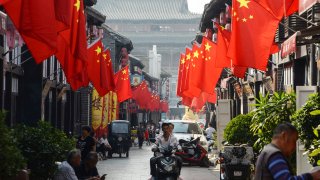
- A key Politburo meeting later this week will review China's economic performance in the first half of the year.
- Ahead of that meeting, China has pledged to optimize the business environment for private enterprises.
- Beijing announced measures to bolster consumption, particularly for household products and electric vehicles.
China is ramping up measures aimed at boosting its economy ahead of a key Politburo meeting this week which will review the country's first half economic performance.
In the past week, authorities have announced a series of pledges targeted at specific sectors or aimed at reassuring private and foreign investors of a more favorable investment environment — but they were largely broad measures, with some lacking concrete details.
Chinese leaders have also signaled in recent weeks they are likely to be judicious and targeted in their policy support.
Get DFW local news, weather forecasts and entertainment stories to your inbox. Sign up for NBC DFW newsletters.
Here are some of the key measures released by the Chinese government in recent weeks.
Private businesses
On Monday, China's economic planning agency announced a series of measures to promote private investment.
Money Report
This follows a rare joint pledge on Wednesday, between the Chinese government and the Communist Party, which vowed to treat private companies the same as state-owned enterprises. Beijing also pledged to ensure fair treatment in areas ranging from intellectual property and land rights to financing and labor supply.
In a 17-point statement Monday, the National Development and Reform Commission pledged to attract more private capital to participate in the construction of major national projects and key industrial chain supply chain projects.
The NDRC said it will support private investment in sectors — such as transportation, water conservancy, clean energy, new infrastructure, advanced manufacturing and modern agriculture facilities.
The agency is also encouraging private investment projects to issue real estate investment trusts (REITS) in the infrastructure sector to promote asset diversification and further broaden investment and financing channels for private investment.
The People's Bank of China and the State Administration of Foreign Exchange last Thursday adjusted their cross-broader financing guidelines to allow companies to borrow more from foreign sources.
Business sentiment has generally soured amid lackluster economic growth after China's initial recovery following its exit from "zero Covid" faltered.
The last three years have also seen heavy-handed crackdowns on internet platform companies including ecommerce giant Alibaba; the education and gaming sectors as well as real estate developers.
"After making life more difficult for many private firms in recent years, China's leadership is shifting course and has made high-level pledges to improve the business environment," Julian Evans-Pritchard, head of China Economics at Capital Economics, wrote in a Friday note.
"But although parts of the service sector would benefit from a more supportive official stance, much of the current caution among private firms reflects wider economic headwinds against which regulatory tweaks are of limited use," he added.
Consumption
The NDRC vowed last Tuesday to "restore and expand" consumption in a wide-ranging plan to bolster growth that includes boosting household income, improving business environment for private firms and stabilizing youth employment.
The pledge, delivered at the agency's regular monthly press conference, came a day after a raft of disappointing economic data prompted renewed calls for policy support to bolster growth.
Last Monday, official data showed China's GDP for the second quarter grew 6.3% from a year ago, missing market expectations for 7.3%. It marked a 0.8% growth compared to the first quarter, and was slower than the 2.2% quarter-on-quarter pace recorded in the January to March period.
Even with a low base from last year, given the Covid lockdown in Shanghai at that time, retail sales growth slowed significantly to 3.1% in June from a year before, compared to 12.7% in May.
Household goods
Last week, within hours of the NDRC statement, China's Commerce Ministry followed with an joint announcement with a dozen other government departments, announcing an 11-point plan to boost the domestic consumption of household consumer goods and services.
This included a directive to local governments to step up the renovation of old homes, a pledge to encourage improvements to online commercial platforms, and developing the concept of "15-minute cities."
Cars and electronics
During a special press conference on Friday, the NDRC released a 10-point plan to increase car ownership, particularly for "new-energy" vehicles.
This will include improving the capacity of rural power grids, reducing the costs associated with purchasing and charging electric vehicles.
In June, Beijing extended tax breaks for the purchases of electric vehicles.






